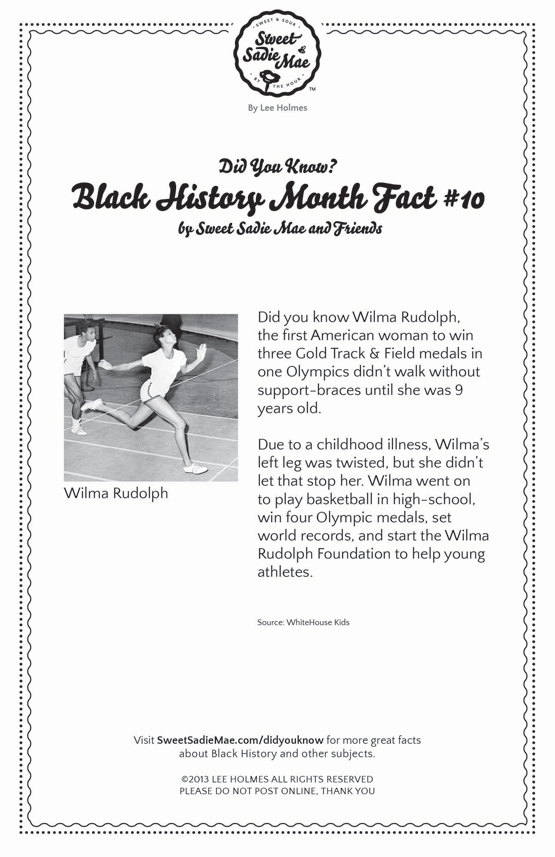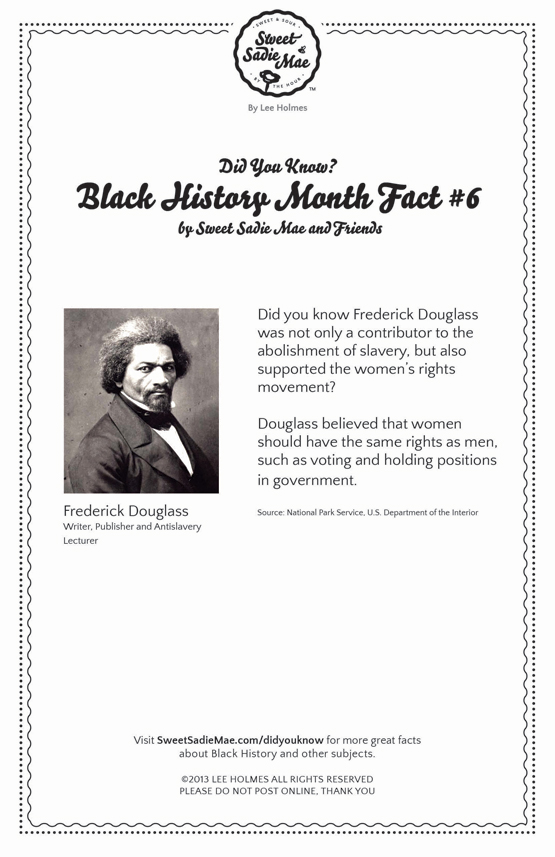Posted: February 27, 2013
Marcus Garvey: Writer, Publisher, Political Leader: Black History Month Fact 17
BLACK HISTORY MONTH FACT #17
Did you know that Marcus Garvey, a successful writer, publisher, business man and political leader, began his love of reading as a child?
Marcus' dad had a large library of books, so he took advantage by reading all he could.
Marcus' love of reading helped him become successful in writing, publishing and business.
Source: Library of Congress

Posted: February 27, 2013
Sojourner Truth: Black History Month Fact 16
BLACK HISTORY MONTH FACT #16
Did you know even though Sojourner Truth was born a slave and had no formal education, she became a historical leader in the fight against slavery and women's rights?
In 1851, Sojourner delivered her famous speech, "Ain’t I A Woman" in support for equality and women's rights.
Source: Library of Congress

Posted: February 22, 2013
President Barack Obama: Education and Civil Rights: Black History Month Fact 15
BLACK HISTORY MONTH FACT #15
Did you know President Obama is a graduate of Harvard Law School and Columbia University?
After law school, President Obama worked as a civil rights attorney helping people protect their rights.
President Obama believes in protecting citizens’ civil rights and granting them equal opportunities.
Source: The White House

Posted: February 22, 2013
President Barack Obama Before He Became President: Black History Month Fact 14
BLACK HISTORY MONTH FACT #14
Did you know President Barack Obama, the first African American President, used to teach constitutional law at the University of Chicago?
Before he became president, President Obama also worked with churches to rebuild communities affected by job loss.
President Obama believes that people have the strength to achieve any goal by working together.
Source: The White House

Posted: February 20, 2013
Civil Rights Act & Voting Rights Act Dr. Martin Luther King: Black History Month Fact 13
BLACK HISTORY MONTH FACT #13
Did you know that even after the Civil Rights Act of 1964 was passed, Dr. Martin Luther King continued to fight for equal voting rights?
The Civil Rights Act made it illegal to treat people differently because of the color of their skin, but there were still voting laws that made it difficult for black people to vote.
Dr. King and others used non-violent protests, walks and speeches to fight against these unfair voting laws. In 1965 the Voting Rights Act was passed, which outlawed unfair voting practices.
Dr. King’s and other protestors’ non-violent actions contributed to the passing of the Voting Rights Act.
Source: Library of Congress

Posted: February 19, 2013
1964 Nobel Peace Prize Winner Dr. Martin Luther King: Black History Month Fact 12
BLACK HISTORY MONTH FACT #12
Did you know Dr. Martin Luther King, the most important voice in the fight for equal rights, won a Nobel Peace Prize in 1964?
Dr. King traveled over six million miles and spoke over twenty-five hundred times to stand up for injustices and inequality.
In 1964, Dr. King was the youngest man to receive the Nobel Peace Prize.
Source: Nobel Prize Web

Posted: February 15, 2013
Mathematician and Astronomer Benjamin Banneke: Black History Month Fact 11
BLACK HISTORY MONTH FACT #11
Did you know Benjamin Banneker a mathematician, and astronomer, taught himself mathematics through textbooks he borrowed?
As an adult, Benjamin used mathematics and astronomy to predict the weather and write his own almanac, which was used by farmers.
Benjamin’s work was so impressive that Thomas Jefferson recommended him to join the survey team that mapped out Washington, D.C.
Source: Library of Congress

Posted: February 15, 2013
The Will of Wilma Rudolph: Black History Month Fact 10
BLACK HISTORY MONTH FACT #10
Did you know Wilma Rudolph, the first American woman to win three Gold Track & Field medals in one Olympics didn’t walk without support-braces until she was 9 years old.
Due to a childhood illness, Wilma’s left leg was twisted, but she didn’t let that stop her. Wilma went on to play basketball in high-school, win four Olympic medals, set world records, and start the Wilma Rudolph Foundation to help young athletes.
Source: WhiteHouse Kids

Posted: February 13, 2013
First Lady Michelle Obama’s Careers: Black History Month Fact #9
BLACK HISTORY MONTH FACT #9
Did you know while working as a lawyer First Lady Michelle Obama decided to switch careers, because she wanted a job where she could help people make their community and neighborhoods better?
After her law career, First Lady Obama worked at the University of Chicago where she developed the university’s first community service program and helped increase volunteerism.
Source: WhiteHouse.Gov

Posted: February 13, 2013
First Lady Michelle Obama’s Education: Black History Month Fact #8
BLACK HISTORY MONTH FACT #8
Did you know First Lady Michelle Obama is not only the wife of President Obama, and the mother of Malia and Sasha, she’s also a Harvard Law School graduate?
Before obtaining her law degree from Harvard, the First Lady attended Princeton University, where she received degrees in sociology and African-American studies.
Source: WhiteHouse.Gov and America.Gov

Posted: February 11, 2013
The Many Roles of Harriet Tubman: Black History Month Fact #7
BLACK HISTORY MONTH FACT #7
Did you know even though Harriet Tubman was born a slave, she grew up to accomplish extraordinary things?
Harriet lead hundreds of slaves to freedom in the North, became a leader in the movement against slavery and a spy for the Union Army during the Civil War.
In addition to these accomplishments, Harriet Tubman also saved lives as a nurse during the Civil War.
Source: The Library Of Congress

Posted: February 08, 2013
Frederick Douglass Supported the Women’s Movement: Black History Month Fact #6
BLACK HISTORY MONTH FACT #6
Did you know Frederick Douglass was not only a contributor to the abolishment of slavery, but also supported the women's rights movement?
Douglass believed that women should have the same rights as men, such as voting and holding positions in government.
Source: National Park Service, U.S. Department of the Interior

Posted: February 07, 2013
Frederick Douglas: Black History Month Fact #5
BLACK HISTORY MONTH FACT #5
Did you know even though Frederick Douglass was born a slave he went on to write books about his life, became a major contributor to end slavery, and an advisor for President Abraham Lincoln?
In 1863, during the Civil War, Frederick Douglas advised President Lincoln on the proper treatment of black soldiers.
Source: Library of Congress

Posted: February 06, 2013
Dr. Patricia E. Bath Doctor & Inventor: Black History Month Fact #4
BLACK HISTORY MONTH FACT #4
Did you know Dr. Patricia E. Bath, an African American doctor and inventor, invented the Laserphaco Probe that helps treat cataracts, a common cause of blindness?
Dr. Bath is also the co-founder of the American Institute for the Prevention of Blindness, which has the goal of preventing blindness and restoring eyesight worldwide.
Source: United States National Library of Medicine

Posted: February 06, 2013
Honesty
Being sincere or free of lying.
Posted: February 05, 2013
Dr. Carter G. Woodson: Black History Month Fact #3
BLACK HISTORY MONTH FACT #3
Did you know Dr. Carter G. Woodson, the main founder of Black History Month, didn’t start school until he was 19 years old?
Dr. Woodson wasn’t able to afford school so he taught himself his ABCs and math. He also worked in the coalmines until he had enough money to go to school.
At a young age, Dr. Woodson understood he would need a formal education to achieve his dreams. That’s why he did everything possible to receive an education.
Source: America.gov Archive
http://www.america.gov

Posted: February 04, 2013
Original Celebration Length of Black History: Black History Month Fact #2
Black History Month Fact #2
Did you know from 1926 to 1976, Black History was celebrated for only one week in February?
In 1976, the Association for the Study of African American Life and History extended the celebration of Black History to one full month.
And that’s why we have Black History Month today.
Source: Association for the Study of African American Life and History http://www.asalh.org

Posted: February 01, 2013
Character Education Coloring Page
Great Character Education Coloring Pages for Girls and Boys
Download our Sweet Sadie Mae, Barkley and Maggie coloring pages.
Posted: February 01, 2013
The Celebration of Black History: Black History Month Fact #1
Black History Month Fact #1
Did you know the original idea of celebrating Black History was created in 1925 by Dr. Carter G. Woodson and the Association for the Study of African American Life and History?
It wasn’t until 1926, one year later, that the first official celebration of Black History took place.
Source: Association for the Study of African American Life and History http://www.asalh.org

Posted: January 10, 2013
What Does Respect Mean?
Respect means having high regard for someone or something.
Respect Definition:
Having high regard for someone or something.
Posted: January 10, 2013
Kindness
Displaying care and concern for others.
Posted: December 27, 2012
Character Education Curriculum
A curriculum designed with the goals of teaching moral and ethical values.
Categories:
Posted: December 27, 2012
Character Education Lesson Plans
Lesson plans designed with the goal of teaching moral and ethical values.
Categories:
Posted: December 02, 2012
What is Character Education?
What is Character Education?
Simply put character education is the instruction of moral and ethical values. Usually character education is taught to younger children, during the developmental years, to help them understand how they should treat others, and how to deal with the ethical and moral decisions they will encounter throughout their life.
Why is character education important for children?
Character education is important for children, because it helps them grow into morally responsible adults. Like any other learned subject such as math, science and social studies, children need to learn how to properly treat others and make decisions that are morally and ethically correct.
Having great character helps children be kinder, make better choices and develop integrity, self-discipline and responsibility. These are all qualities of a decent contributor to society, which is the goal of character education when taught to children.
Why Good Character is Important for Children to Have?
Good character is important for children because:
- It allows children to become positive contributors to their communities
- It makes children feel good about themselves
- It helps children love others
- It allows children to be role models of kindness, integrity, respect and responsibility
- It initiates the pay-it-forward concept
Let us know your thoughts about characer education. Feel free to leave them in the comments.
Posted: October 01, 2012
Character Education
Simply put character education is the instruction of moral and ethical values. Usually character education is taught to younger children, during the developmental years, to help them understand how they should treat others, and how to deal with the ethical and moral decisions they will encounter throughout their life.